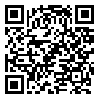Volume 7, Issue 2 (4-2022)
CJHR 2022, 7(2): 69-74 |
Back to browse issues page
Zeinab Shokouhi1 

 , Nafise Hamidi Tabar2
, Nafise Hamidi Tabar2 

 , Fatemeh Naderi3
, Fatemeh Naderi3 

 , Fatemeh Meri4
, Fatemeh Meri4 

 , Fatemeh Saadat5
, Fatemeh Saadat5 

 , Javad Seyed Jafari *
, Javad Seyed Jafari * 

 6
6


 , Nafise Hamidi Tabar2
, Nafise Hamidi Tabar2 

 , Fatemeh Naderi3
, Fatemeh Naderi3 

 , Fatemeh Meri4
, Fatemeh Meri4 

 , Fatemeh Saadat5
, Fatemeh Saadat5 

 , Javad Seyed Jafari *
, Javad Seyed Jafari * 

 6
6
1- Department of Clinical psychology, Shiraz Branch, Islamic Azad University, Shiraz, Iran.
2- Department of educational science and psychology, Islamic Azad University Khorasgan, Isfahan, Iran
3- Department of Psychology, Nain Branch, Islamic Azad University, Nain, Iran.
4- Department of Psychology, Islamic Azad University, Tehran, Iran.
5- Iranshahr University of Medical Sciences, Iranshahr, Iran.
6- Department of Clinical psychology, Shiraz Branch, Islamic Azad University, Shiraz, Iran. , javad_jafary90@yahoo.com
2- Department of educational science and psychology, Islamic Azad University Khorasgan, Isfahan, Iran
3- Department of Psychology, Nain Branch, Islamic Azad University, Nain, Iran.
4- Department of Psychology, Islamic Azad University, Tehran, Iran.
5- Iranshahr University of Medical Sciences, Iranshahr, Iran.
6- Department of Clinical psychology, Shiraz Branch, Islamic Azad University, Shiraz, Iran. , javad_jafary90@yahoo.com
Abstract: (894 Views)
Background: Type 1 diabetes patients may find it difficult to cope with diabetes-related stress, which can be improved by accessible interventions.
Objective: The goal of this study was to determine whether coping skill training could increase self-efficacy among adolescents with type 1 diabetes during the COVID-19 pandemic lockdown.
Materials and Methods: This study was conducted as a pretest-posttest design with a control group. The study population was adolescents diagnosed with type 1 diabetes at Tehran Diabetes Center during the COVID-19 pandemic lockdown from June to August 2021. Sixteen adolescents with type 1 diabetes were selected using a purposeful sampling method. The participants were divided into experimental (n=9) and control groups (n=7). The measurement tool was the General Self-Efficacy Scale. A total of eight sessions of coping skill training took place for the experimental group; no intervention was performed for the control group. A multivariate analysis of covariance was used to analyze the data. Statistical analysis was performed utilizing SPSS, Version 23.
Results: There was no significant difference between the intervention and control groups in terms of age sex, and baseline score of self-efficacy. In the posttest, self-efficacy score significantly improved in the intervention (71.52, SD=13.86) compared to the control group (48.13, SD=12.96) (F=18.97, P<0.001, η2=0.59).
Conclusion: According to this study, adolescents with type 1 diabetes who received training in coping skills showed increased self-efficacy. As a result, it can be concluded that adolescents with type 1 diabetes need coping skills training interventions, including self-management support.
Objective: The goal of this study was to determine whether coping skill training could increase self-efficacy among adolescents with type 1 diabetes during the COVID-19 pandemic lockdown.
Materials and Methods: This study was conducted as a pretest-posttest design with a control group. The study population was adolescents diagnosed with type 1 diabetes at Tehran Diabetes Center during the COVID-19 pandemic lockdown from June to August 2021. Sixteen adolescents with type 1 diabetes were selected using a purposeful sampling method. The participants were divided into experimental (n=9) and control groups (n=7). The measurement tool was the General Self-Efficacy Scale. A total of eight sessions of coping skill training took place for the experimental group; no intervention was performed for the control group. A multivariate analysis of covariance was used to analyze the data. Statistical analysis was performed utilizing SPSS, Version 23.
Results: There was no significant difference between the intervention and control groups in terms of age sex, and baseline score of self-efficacy. In the posttest, self-efficacy score significantly improved in the intervention (71.52, SD=13.86) compared to the control group (48.13, SD=12.96) (F=18.97, P<0.001, η2=0.59).
Conclusion: According to this study, adolescents with type 1 diabetes who received training in coping skills showed increased self-efficacy. As a result, it can be concluded that adolescents with type 1 diabetes need coping skills training interventions, including self-management support.
Keywords: Coping skills training, Self-efficacy, Adolescent, Type 1 diabetes, COVID-19, Pandemic lockdown
Article Type: Original Contributions |
Subject:
Health Education and Promotion
Received: 2021/12/29 | Accepted: 2022/02/21 | Published: 2022/04/1
Received: 2021/12/29 | Accepted: 2022/02/21 | Published: 2022/04/1
| Rights and permissions | |
 | This work is licensed under a Creative Commons Attribution-NonCommercial 4.0 International License. |


